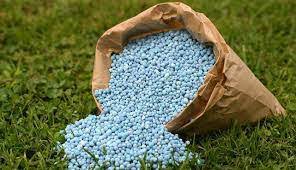Even though organic fertilizer is being championed and encouraged for use by farmers, especially in this period where the Russia-Ukraine war has made inorganic fertilizers expensive, farmers in the Bono East capital, Techiman, have still not embraced this advocacy, saying the latter yields better harvest than the former.
For some of these farmers, organic fertilizers take so much time to fertilize the farm, hence, there cling to the inorganic ones which have rapid results.
Selina Antwi, who is into vegetable farming, said although she has some knowledge of the use of organic fertilizer, she vehemently opposes the idea of using it, explaining that it is time-consuming and requires a lot of investment to prepare the land.
“Inorganic fertilizers are the best. Organic farming is very stressful and time-consuming. You will need to use tractors to dig up the land before applying them which makes the work difficult,” she said.
Also, a vegetable, yam, and maize farmer, Twum Isaac, in an interview with the B&FT, said: “I haven’t used some before. I think education on organic farming must be high because some of us haven’t used it before.”
Another vegetable farmer and wholesaler of farm equipment, including inorganic fertilizers, Simon Asare, for his part, urged the government to stop pushing for organic farming because it doesn’t help the farmers.
“Organic farming is good; but when there are no rains, it doesn’t help. There is so much heat in the animal droppings and other nutrients used in its production, therefore, without the rain, it will not decay early enough to be used on the farms. But with inorganic fertilizers, the little water in it makes it good for farming and it enhances plant growth.
“Government should stop pushing farmers to move on to organic farming. If the government does not assist us to get more fertilizers to grow our crops, a time will come where organic fertilizers will be more expensive than the normal fertilizers we use,” he maintained.
No gov’t subsidies on inorganic fertilizers affect farmers
The farmers further urged the government to help them with loans and make fertilizer subsidies available to boost their work.
“We are asking the government to help us. Whether it is assisting us to get loans from the banks or still giving us subsidies on the fertilizers. This will help us grow more food crops. Even with a subsidy, a bag of fertilizer costs GH₵320. Without the subsidy, we are buying it at GH₵380 so the difference is small. This does not help us,” Mr. Asare said.
“It is true there are no subsidies on fertilizer these days. This makes working on the farms very difficult for the farmers. We are not even getting money to buy. Those who manage to buy have reduced the size of their farmlands. When the subsidies were coming in, the farmers were able to buy enough fertilizers for their lands. We used to buy the 25kg bag of fertilizer for GH₵48. Without the subsidies, we bought them at GH₵160 last year. This year, we are buying it at GH₵400. There are enough fertilizers but the price is so high.
Increase in farming chemicals is another worry
Besides the issue with the high cost of fertilizers, the farmers are also complaining about other chemicals, such as pesticides, fungicides, and weedicides, among others, used in their production. They say these chemicals have seen their prices move upward by almost 100 percent within a one-year period.
“After the fertilizer, you need to buy fungicide to help control fungi on the farms, and pesticides to control pests. Prices of these products have shot up. We used to buy Lambda insecticide at GH₵18, but it’s now GH₵30.
“To make it worse, there are lots of sub-standard farm chemicals on the market because the original products are expensive, and farmers opt for the cheap products because they cannot afford the originals,” Mr. Asare noted.








